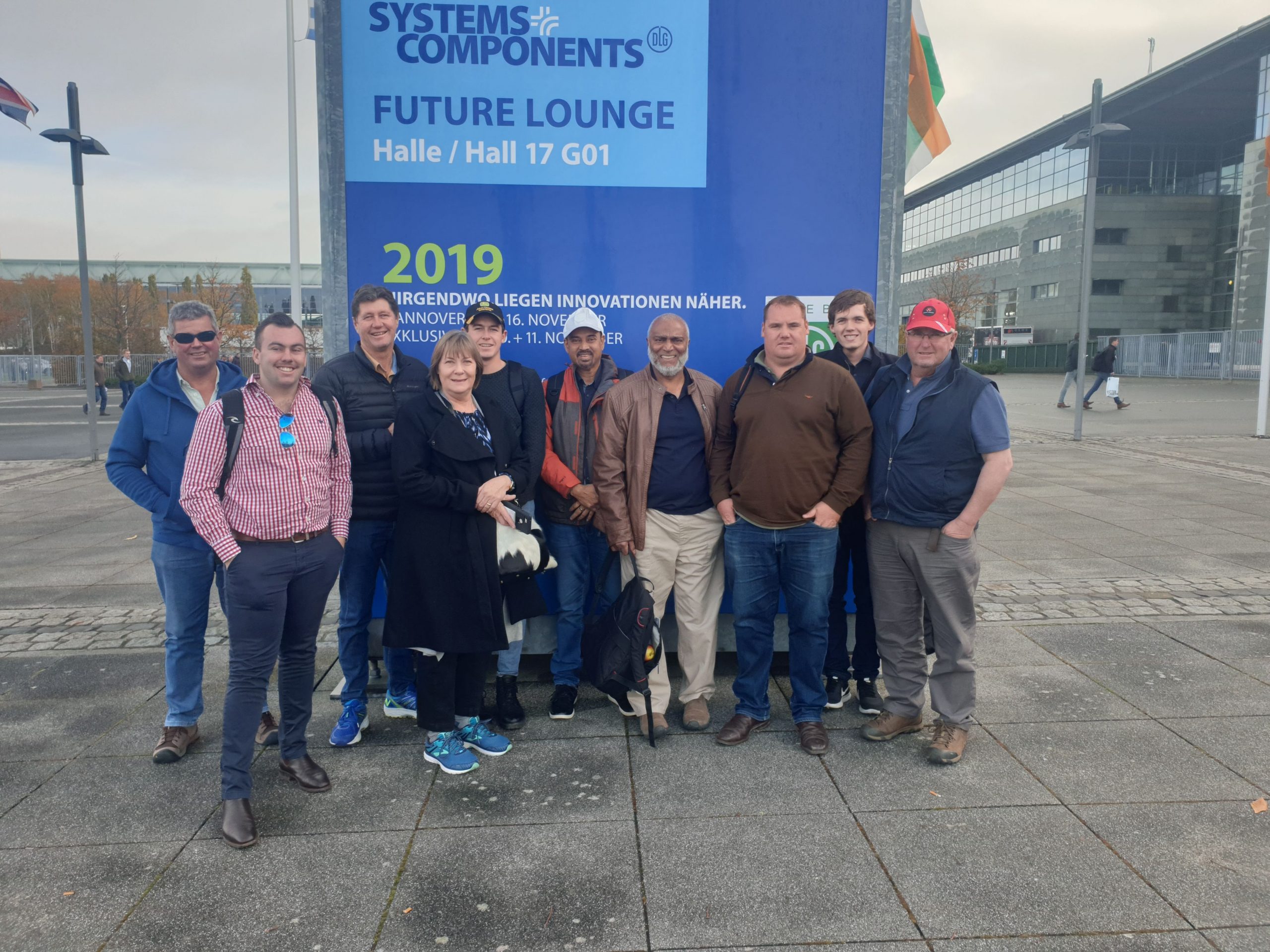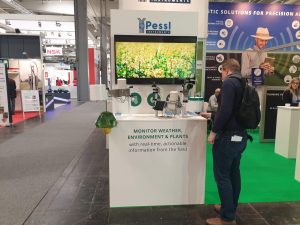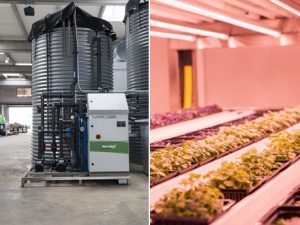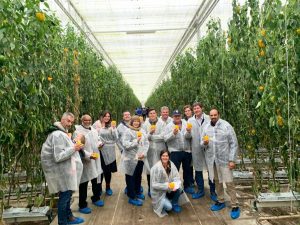Connecting Australian growers to European ag-tech innovation
In November, a group of vegetable growers travelled to Germany and the Netherlands, including a visit to Agritechnica, as part of the 2019 European Industry Leadership and Development Mission. AUSVEG Tour leader Shakira Johnson reports on the highlights of the mission and what the Australian growers learnt from visits to various locations showcasing innovative ag-tech solutions for modern farming.
Agritechnica: Hanover, Germany
As Europe’s largest farm machinery and technology show, held at the world’s largest exhibition grounds, there is no better place for ag-tech fans and those seeking to improve their farming operations than Agritechnica. A diverse mix of vegetable growers from across Australia made the journey to Hanover, Germany, to spend a week learning all about cutting edge technologies and innovations for agricultural systems at Agritechnica. This was followed by a week of tours to various locations around the Netherlands focusing on innovative technologies for horticulture.
The tour began at Agritechnica, a leading international exhibition for agricultural machinery and equipment, which takes place every two years in Hanover. From massive tractors fitted out with the latest high-tech gadgets to low-cost IoT (Internet of things) sensors to support on-farm data collection, Agritechnica is considered one of the most important agricultural technology exhibitions in the world. In 2019, the event featured more than 2,800 exhibitors from 52 countries and 457,600 visitors from 130 countries.
Tour participants took advantage of the opportunity to engage with new and emerging ag-tech, look at new approaches to age-old on-farm issues and hear from research institutions from all over the world to develop a greater understanding of up-and-coming applications of research and technologies outside of Australia. Many participants were able to take advantage of the opportunities to meet with representatives from companies to discuss how they can implement new technologies on-farm back home.
Urban agriculture: Amsterdam’s only vertical farm
The tour of the Netherlands began just outside Amsterdam at the city’s first vertical farm, a start-up company called GROWx. The company focuses on the idea of local produce, working with chefs to develop and grow microherbs that they supply to restaurants in the Amsterdam area. Using renewable energy and circular packaging, the company has a focus on being environmentally-friendly and sustainable. The growing chambers are located inside converted shipping containers, using a special combination of blue and red LED lights. Kevin from GROWx took the group through the process of germinating seed, energy usage, fertigation and watering processes and how they reuse and recycle each element of production.
Following the visit to GROWx, the group headed to north Holland to visit the smartfarm greenhouse, Bezoek Agriport, the world’s largest greenhouse for production of orange and yellow capsicums. We were greeted by owner Petra Barendse, who led a tour of the facilities that included an explanation of the geothermal energy and natural gas system used to produce heat, carbon dioxide and electricity. The heat is stored during summer, used to heat the greenhouses in winter, and carbon dioxide is purified and used in the greenhouses. Rainwater is captured and stored in a large water facility on-site and used in fertigation of the plants in the greenhouses. Petra introduced their integrated pest management program, with a range of beneficial insects, pheromone traps, parasitic wasps and spiders used for crop protection. Participants also received a demonstration of Bezoek Agriport’s smartfarm trolleys, which assist with traceability throughout harvest.
The next day, we travelled to the Hague to tour the facilities at Rijk Zwaan, where the group was led through the seed testing facility. The next stop was AppsforAgri, a unique IT agency that boasts a team of software-developers, data analysts and agronomists. The tour group was impressed by the high-tech, low-cost SmartFarm technology that has been created to deliver complete solutions in the field of precision farming. This ranged from sensors to management information that allows growers to work efficiently and sustainably.
Wageningen University Entomologist Rob van Tol introduced the group to his research that focuses on improving effectiveness of visual traps for plant pests. He demonstrated an experiment that is designed to monitor insect behaviour with some promising leads on how traps may be improved in the future. The group was excited to see research outcomes leading to improved pest management.
Grower-owned international sales and logistics
Next, we headed to Barendrecht to visit The Greenery, an international sales organisation for fresh fruit and vegetables. The Greenery is owned by the Coforta grower cooperative, supplying fresh fruit and vegetables to supermarkets, wholesalers, caterers and the processing industry all-year-round. It has a unique system for pricing, offering growers flexibility to secure continuity in the purchase of their product. This is achieved by entering long-term partnerships with customers.
The Greenery has fully-automated logistics infrastructure and two modern distribution centers. Products can reach the shelves within a day from the field or greenhouse. There is a sophisticated tracking system that provides insight into all stock, transport flows and real-time point-of-sale checkout information. The tour participants were impressed with the grower cooperative, particularly with the pricing structures and traceability of products.
The tour’s final day began with a trip to World Horti Center, a knowledge and innovation center for international greenhouse horticulture that provides a learning environment for 1,200 senior secondary and higher vocational education students. It also has a modern research centre for technology, cultivation systems, crop protection and breeding, and a year-round exhibition with more than 100 leading horticulture businesses.
This was followed by a visit to Koppert Cress, a microgreens producer that has built a brand and marketing campaign, setting them apart as a premium producer. Koppert Cress sells to high-end Michelin star chefs and has left no stone unturned in marketing and providing a ‘Cressperience’ to anyone who visits their operation. Participants were treated to a tasting session of the cresses, including a glass of tea made with fresh herbs, as well as a tour of the facility.
Strengthening relationships
The 2019 European Industry Leadership and Development Mission – Agritechnica offered participants the opportunity to build strong networks among the diverse group of tour participants. It connected 10 established and emerging horticulture industry leaders with peers, innovative agtech, growing operations and research institutions across Europe, while developing a greater understanding of global horticulture. Participants are encouraged to share this knowledge and insight with their peers upon their return to Australia.
Find out more
A full project report will be released in the coming weeks and will be made available on InfoVeg.
This project has been funded by Hort Innovation using the vegetable research and development levy, contributions from Australian vegetable growing businesses and contributions from the Australian Government.
Project Number: VG18002




